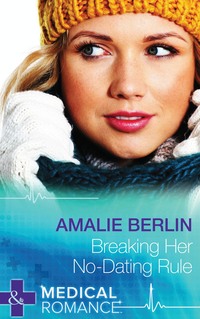
Полная версия
Healed Under The Mistletoe
But she hoped to sort out the position and her capability before three months were up. The earlier the better, so if she needed to run, she could just go, no harm, no foul. They could fire her without much explanation in that time too, but she should be able to judge her inadequacy first, regardless of whoever got stuck babysitting her.
It didn’t need to be him.
It was still an insulting word, but she’d take whoever would allow her to shadow them.
“Take it up with Backeljauw,” Masterson said, stepping neatly out of the discussion and standing up. “Good luck, Ms. Sabetta. Welcome again. Don’t let McKeag scare you off—he’s not the brother we use for PR for a reason.”
McKeag gave a long-suffering eye-roll, looked at her clothes, then turned. “Come on. We’ll go to the locker room, you can quickly change, and we’ll continue to Emergency.”
CHAPTER TWO
LYONS STRODE OUT of Masterson’s office, his spine nearly creaking from the tightness that had seized every muscle in his body since he’d found that ridiculous Christmas assignment.
Despite the carpet inside the office of Human Resources, he could make out the sound of movement behind him. Either she was following, or the ever-flailing assistant was. He didn’t pause to check; she’d follow now or someone else would escort her down later.
He couldn’t afford to coddle the woman. If he could exchange his family’s fortune for time, he would. When he was on duty, there was never enough of it. There hadn’t been enough for his trip to HR this morning, but he’d gone anyway, intending it to be short. But it had already been too long. Who knew what had come into Emergency in his absence? If he wasn’t there, he couldn’t keep an eye out for inevitable trouble.
No matter how called he felt to emergency medicine, Lyons knew from hard experience the sorts of people who came in. Pediatric specialists might treat innocent children, but were exposed to their unsavory parents too, or had to treat the aftermath of abuse. Those who practiced widely, engaging in everyday emergency medicine, could see kindly grandmothers or men who’d injured themselves while beating another person to death. Patients with police escorts, cuffed because they were a danger to others, not that it always did much good. Trauma surgeons often treated the already unconscious, but afterward had to deal with those who’d accompanied the patient—people who might turn violent when given bad news.
Or worse, in the high flow of traffic in and out of Emergency, a madman with a gun could blend in and just start shooting. That happened here.
He hit the hallway without breaking stride. On a good day, he didn’t have time to coddle the woman, and that was without Christmas insanity being added into the mix.
His main task was vigilance, and medicine came second. He had to do what he’d failed to do last Christmas and pay attention to what his gut had been saying then and was saying now.
He heard rapid footfalls on the hallway’s tiled floors behind him—two steps for every one of his to catch up—and called over his shoulder, “Quickly.”
The difference between this Christmas and last Christmas was him understanding what his gut was saying. The three bullets fired into him by the husband of a colleague had become his gut’s Rosetta stone, the wake-up call that made him pay attention to everything—both for his own benefit and those who hadn’t had the misfortune to share in his life lessons.
Even without the sound of her scurrying, her presence heated his back. For once, that awareness of someone behind him didn’t prickle like danger. He just felt her there. Awareness that bothered by its nature, by the way it fractured his attention. She might not be a physical danger, but the way he heard and categorized her sounds—breath, step, fidget—was by robbing his concentration.
It was out of character for him to feel anything, really, except for the tension he’d become so intimate with he even carried it into his sleep. Mistrust of everyone, including himself, was also a constant companion. The attraction sparked by this woman—because he wouldn’t lie to himself; that was what it was—he didn’t like. Didn’t want.
Still, he had to be civil. This was his workplace; he only yelled when someone deserved it. Just get this done quickly, hand her off to Backeljauw for reassignment and get back on duty.
Breaking his habit, he stopped at the lift and summoned it, giving her a chance to catch up.
She stepped into his side vision, beckoning him to look at her fully again, for the flaws that had to be there. He was usually good at finding the unpleasant aspects of other people; they would take some shine off.
His first thought upon having seen her, standing across the office from him, her eyes wild and obviously frightened, had been predatory but restrained. The door hadn’t slammed. He hadn’t raised his voice, not once, but she’d still looked at him as if he’d been a barely leashed bear about to eat her up.
The thought, the sexual grind of it—sudden and unexpected—made his lower abdomen contract and start to heat.
Damn. Look harder, find the flaw.
He scanned her features. “Are you ready for this?”
The grim set of her soft mouth said no, but that wasn’t the flaw.
“Yes.”
Her lie was a flaw, but not in her appearance. Still not helping.
Neither was her silky, brilliantly colored hair. Sorrel, it was like sorrel.
Still not the flaw—even if it prompted him to think of her in equine descriptors. Disturbing, but his flaw if it was one, that and a dearth of words to name that rich color. Earthy brown with fire and gold mingled in. Not her flaw.
The braided knot she wore it in suggested length and would’ve looked very professional but for the curling lock in the front that bounced free no matter how frequently she tucked it behind her ear. She looked more as if she should be selling some upscale shampoo than wearing scrubs. Which she wasn’t wearing yet.
“Locker room first,” he muttered, trying to put himself back on track, then continued picturing horses because it seemed like the thing to do. A way to keep himself from dwelling on the fact he was taking her somewhere to take her clothes off and change into the scrubs she’d been given. He shouldn’t be thinking like that. She was practically a child.
That was the flaw. The thing he could cling to: common damned decency. She was too young. That would keep his unexpected flare of interest under control.
He locked his gaze to her nearly black eyes. “Did you work at all as a nurse before pursuing your advanced license?”
Her brows came together, forming the only line he could see on her face, and taking away a little bit of that wide-eyed vulnerability he kept seeing when he looked at her.
“I worked as an RN for three years before returning to school for another two years.”
“And you were licensed three years ago.” He remembered that as well. Laws existed to keep him from asking her age, but he could ask questions about her experience and qualifications, which would let him estimate.
Eight years ago she became an RN. It would’ve taken at least two, but more likely four, years to have become an RN. Likely twelve years of combined work experience and education. She was certainly no younger than twenty-eight, but probably closer to thirty.
Didn’t look it, but it was still enough of a gap for him to work with. Coupled with his track record with not getting involved on any personal level with colleagues at Christmastime helped solidify his determination. That and duty. He might not know when the danger his gut warned against would arrive, but he knew it would come.
The elevator finally dinged, and he stepped in with her right behind him. Both of them remained silent for the rest of the journey. All he heard outside the hospital’s PA system, and the lullaby music that played announcing a birth in the hospital, were her rapid footfalls to keep up with him in the hallway once they reached their floor, and the plummeting of his own thoughts.
“Locker room,” he finally stated, pushing in. “What locker were you assigned?”
She gave the number, two down from his own locker, naturally, and he led her around the middle bank of lockers to locate it. She pulled a small envelope from her pocket with the locker number written on it. Key. Good.
Time to hurry this up.
“Two minutes.” He checked his watch, then gestured to the locker. “Get changed, come out to the hall. Two minutes.” All the time he was willing to spare for babysitting.
He exited the way they’d come, back to where he wouldn’t be tempted to peek at her undressing—despite the self-disgust that came with it, he knew it’d be a struggle to contain the desire to look as he heard her peeling off that creamy blouse and black trousers.
Safely outside, he leaned and shifted his attention from picturing horses, in an attempt to control his thoughts, to the cases he’d left being seen in Emergency. Specifically, the man who vibrated with ill intentions and who’d given Lyons something more than paranoid ideas, gave him genuine cause for concern.
Was she done? How long could it take to change?
It had been so long since he’d felt a tiny spark of desire, he didn’t quite know what to do with it. Even if it was in any way appropriate. His younger brother, newly involved with one of their peers, had recently accused him of being dead from the neck down, and he hadn’t exactly been wrong.
For the past year, he’d felt very little, aside from bouts of irritation and maybe a little paranoia, both of which served his purposes. Kept him sharp. He got irritated with people because stupidity and incompetence were pet peeves, and he paid close enough attention to his surroundings and everyone around him to stay safe, so he saw all the stupidity that went on. None of that inspired his libido.
Even before the shooting, he’d suspected violence and darkness lay at the heart of every person on the planet. That event had just driven the point home. Even the wide-eyed nurse practitioner changing in the other room had something wrong with her, deep down. Never mind her timid manner. Innocent masks were still masks.
He had darkness, he knew. Wolfe had it. Most people tried to fight that darkness, most of the time, or used coping mechanisms to cover it. Wolfe’s jokes and sarcasm. His minute-by-minute reminder of the need for restraint and vigilance.
He checked his watch just as the second hand rounded twelve again. Three minutes past his two-minute limit.
No one took that long to change into scrubs. It was two simple pieces of clothing and a change of shoes.
He knocked on the door, as if it weren’t a large public employee space, and before the sound had stopped resonating in the wood, his comm buzzed, a broadcast message immediately following. Four words.
All hands on deck.
His gut tightened.
All hands.
Departmental code for large-scale emergencies, when they expected to receive more patients than they were equipped to deal with. The kind of numbers that could only constitute a large group tragedy.
Right. Time for civility was past.
Decision made, he pushed into the locker room.
“Sabetta, what the devil is taking you so long?” He rounded the corner and found her wearing the scrub bottoms and shoes, but nothing above that save for a lacy pink bra that momentarily wiped his brain of any other thought besides the desire to stare, and absorb how delightful the pale pink lace looked against her tanned skin.
She had one foot braced against the locker beside hers, her blouse clamped between her elbow and her ribs, and both hands on the locker’s latch, trying to wrench the thing open.
“It’s stuck.” She sounded breathless, as if she’d been fighting it for a while.
Slower than he’d like, his brain started to work again. He could either ask for details, spend time opening it himself or deal with it later.
All hands.
Deal with it later. That would get her clothed the fastest and time mattered.
“Put your top on,” he bit out, dragging his gaze away, and opened his own locker instead of even attempting to wrestle hers into submission. As soon as he had it open, he began shoveling her things inside.
“If there’s anything in here you need, speak now. We’ve got a large emergency to deal with. They’ve called all hands, which means even other departments send down whoever is free to assist. We need to go.”
She stopped everything, maybe even breathing, for long enough that he had to look at her and found her eyes too wide again. And focused on him.
This was a mistake. She wasn’t up for this.
Her eyes were rich chocolate, and the innocence he saw sucked him in. He protected others from danger, should he be protecting patients from her? Or her from rushing into the deep end before he knew she could swim?
Whatever she was thinking passed, and it really had only been a couple of seconds before she started moving again, tugging her shirt in place and thrusting her hand into his locker to grab her stethoscope, a pen and her phone from her bag.
“I’m ready.”
Another lie. But then again, it was the same lie he told himself every morning at the start of shift, when the double doors that cordoned off Emergency from the rest of the hospital felt like gates to a bloody battlefield where he was going to drag off bodies.
No. She wasn’t ready. But he didn’t have time to coddle her.
As soon as they hit the hallway, he sped up to run down the three turns it took to reach Emergency, with her following close behind.
Another thing he had no time for: dropping her off with Backeljauw to find a new sitter. That would have to come later.
No sooner had he reached the monitoring station than he had to step aside for a stretcher and team to roll past. The man on the stretcher had dark red compresses and bandages held to his abdomen. Conley headed the team, but, seeing him, nodded, which he took as a request to follow.
“Sabetta.” He said her name, leaving her to figure out what she was supposed to do, and hurried off with the team.
Abdominal bleeding. A mass event. His mind could supply only one cause. Was this it, what his gut had been warning him about?
“Was it a shooting?” he asked Conley when he caught up, prompting her to begin her report there, since she was obviously wanting to hand the patient off. Pediatric emergencies were a little different from this kind of trauma.
A look flashed across her bonnie freckled face, confusion and then sympathy, but she shook her head. “Subway derailed. Yours is in triage.”
She knew. His brother had obviously been sharing, and Lyons didn’t have the mental currency left to be angry about it.
Derailment. That could still be a man-made incident, but it wasn’t a gun. It couldn’t follow into the department and begin attacking personnel, unless it had been orchestrated and was the first step in a larger plan.
He turned, nearly trampling his unfortunate shadow, and had to grab her shoulders to stop them both making more of a mess of this. She grabbed his forearms in return, back to the wild-eyed stare as he took a breath and put her to the side to step around.
He pushed the tingle spreading from the center of his palms and hot on his arms from his head and jogged to meet the next stretcher coming out of triage.
Tingles didn’t matter. The delicate, fragile-feeling slender shoulders on his new colleague didn’t matter either. His too-young new colleague.
She kept up this time.
“What have we got?” he asked the nurses and paramedics rolling with his new patient.
“He was standing, and when it jumped track, he flew. Person from behind him hit him right after.”
Crushing damage.
“Name?” Sabetta asked, reaching for the chart as they ran alongside the stretcher.
“Samuel Riggs.”
“Mr. Riggs?” she called in his ear but got no response. “How long has he been unconscious?”
“Since it happened, probably. Uneven pupils, he’s breathing too fast. Tachycardic,” one of the paramedics filled in as they wheeled into the treatment bay.
“Get his shirt off.” Lyons gloved and reached for his stethoscope.
She beat him to it, listening to the patient’s heart while the others in the team fell in, taking the steps he didn’t even need to order at this point. Get an IV started. Hook up the telemetry to monitor vitals.
A good sign, not freezing up as he’d half expected.
“Get a blood workup,” he ordered, joining her in listening to the man’s heart and lungs.
She’d grown a bit paler than she’d been, but that wasn’t unusual for first-timers.
“Thoughts?” That would tell him more than blanching.
“His pulse is far too rapid,” she answered, backing up the paramedic’s report. “And he’s heavily bruised. There’s also a substantial lump on his head that I can see. If his pupils are unreactive, he needs a CT.”
This was easier, working with a critical patient to take his focus.
Lyons listened again. Everyone breathed faster when tachycardic. The heart didn’t pump blood and circulate oxygen efficiently, which caused the body’s natural remedies to kick in, even if they couldn’t help. He breathed faster naturally because his heart beat faster, it just didn’t help.
“What’s his pressure?”
One of his nurses took it manually while another worked on the telemetry and read off numbers far too low for his liking. She’d gotten the obvious things, and this wasn’t a teaching hospital, but it was his hospital, and he needed to know his peers could handle themselves.
“What do you want to check?” He knew what he wanted to check, but he’d give her one shot since all the techs should be descending on the room any minute.
“Rapid heart and low blood pressure, along with all this bruising from the impact. I’d want to check for internal bleeding.” She shook her head as she said it, as if she knew the answer was wrong, but stuck with it. “The head trauma is separate.”
Right about the head trauma, wrong about the internal bleeding—which, while probably present, wasn’t the most immediate danger to life.
“Look at his oxygen levels.” He indicated with a nod.
A number in the high eighties; he could tell by her expression that she recognized it wasn’t good.
“What tests?” he asked, giving her another shot.
“Typing for possible transfusion, a CBC, maybe troponin levels?”
Sticking with bleeding, but with a twist?
“Testing for heart attack?”
Wrong.
“All heart damage causes the same enzymes to release.”
He waited for her to listen to the patient’s chest one more time, still not leading.
She placed the bell to the man’s chest and listened, but not to his lungs. Just his heart. It was the obvious symptom, the flashy thing demanding attention. When she commented again, it was on the speed, and shouldn’t they slow it down? She’d somehow managed to miss that distinctive crackling sound his lungs made upon inspiration.
She’d said she normally worked Urgent Care facilities, not places that saw much active emergency. She wasn’t ready for this, so out of her depth it was almost laughable. When he spoke to Backeljauw, he’d suggest she be shifted to the non-emergency cases.
“I want a CT, head and chest. Image and circulation.” He directed his team. “And a blood panel. At least one lung has been damaged. I want a D-dimer.”
“For clotting?” she asked.
“Go back to the station and wait.” He grabbed his comm to suggest to Imaging that they hurry the hell up, but as she stood, looking confused, added for her benefit, “I don’t have time to hold your hand through this. Neither does he.”
CHAPTER THREE
STICKING AROUND TO defend herself or make excuses would’ve taken valuable time away from the patient, so Belle did as McKeag growled at her, slipped quietly out of the room and found her way back to the nurses’ station.
Her central nervous system couldn’t decide how to react to that whole humiliating set-down. Her face alternated between burning at a temperature best measured in Kelvin and the stormfront of an approaching Ice Age any time she relived the joy of the actual rebuke, and the number of eyes on her, the team working as she failed her first patient.
Still, with the hospital in the throes of a large-scale emergency, standing there, observing the bustle and scurrying about without helping somehow could be nothing short of dereliction of duty.
She wasn’t a doctor. She wasn’t trained for this type of medicine or level of emergency straight out of the gate and had truly only offered her best educated guess when prompted, but it still felt the same when an expert—a peer—immediately found her lacking. Even one she knew to be unpleasant in other circumstances already.
Something about it had felt like a teaching moment, but, in retrospect, she could see it had been a test. An unfair test, the kind of test only a real jerk would lob at a new colleague in the first five minutes on the floor, but still a test she’d failed.
It wasn’t just pride that never wanted to fail a patient. Not everyone went into medicine for the right reasons, but Belle had. Her main role models had been Dad and Nanna, a city cop and a former Army nurse. Belle wanted to help people, it was a core tenet of her personality. Seeing the nurses who’d taken care of not only her dad as he’d lingered in the days between when the bullets had wrecked his insides and when he’d actually died, but also the fourteen-year-old girls who couldn’t leave his side, had solidified that need to help into a calling.
And she was just standing around, while other people helped eased suffering.
If this was just how things went in a large, metropolitan emergency department, she had to either get out now and make this a one-day affair or find that steel Sabetta core and a way to help.
Like a gift from a higher power, the woman they’d initially followed passed by the nurses’ station, a light at the end of the tunnel. Belle stood and gave chase. She’d directed McKeag earlier; she’d have ideas on where Belle could be of use.
“Doctor?” Belle called.
The woman spun to face her as if she’d been expecting her call.
“Ysabelle?” Her smile and the soft southern cadence of her speech seemed to project sunshine from her pretty, freckled face and blazingly blue eyes.
For a moment, Belle even stopped mentally cursing McKeag to a lifetime of stubbing his right pinky toe any time he tried to go shoeless and enjoy the simple pleasure of the earth beneath his feet. This doctor was the exact opposite to McKeag’s surly presence—someone Belle could identify with.
“I’m Dr. Angel Conley, and we’re going to be working together today.” She offered a hand. “Do you prefer to be called Ysabelle or Sabetta? You can call me Angel.”
“Belle,” she managed to get out, then shook the offered hand. “Dr. McKeag wanted me to wait, but—”
“Yeah, Lyons is—Well, he doesn’t work and play well with others.” Angel added, “But I’m sure we can make the request for you to stay with him if you want. Between you and me? I’d rather shadow an angry mule than Lyons when he’s on a tear. Which is nearly always.”
The gentle teasing confidence gave a little shot of hope to counter the increasingly awful rot in her chest.
Belle squeezed Angel’s hand, needing exactly that connection in that moment—she’d have hugged this stranger if she could’ve—it seemed the only thing to go in her favor since she’d arrived in New York. But still. “I’m not sure he should receive all the blame here. I apparently went the entirely wrong direction with the patient.”
“We all have our specialties, and I’m sure we’ll find yours,” Angel said, gesturing for her to follow. “I’m a pediatric emergency specialist. Kids are my specialty, but I still need the help of trauma surgeons in unfortunate instances. Or cardiac specialists. We have a network. But we’ll talk more about this later. How are you with stitching?”














